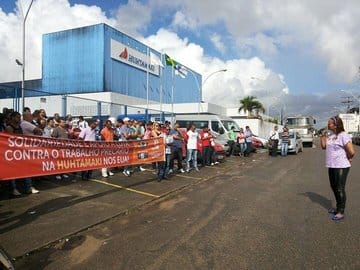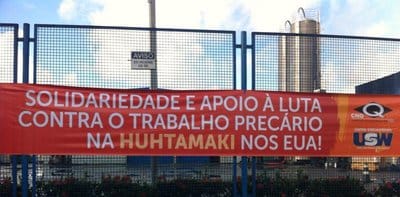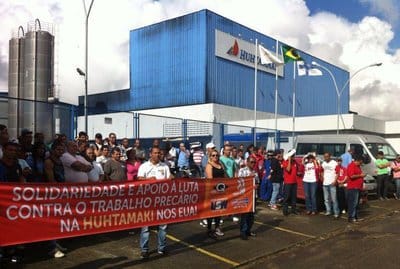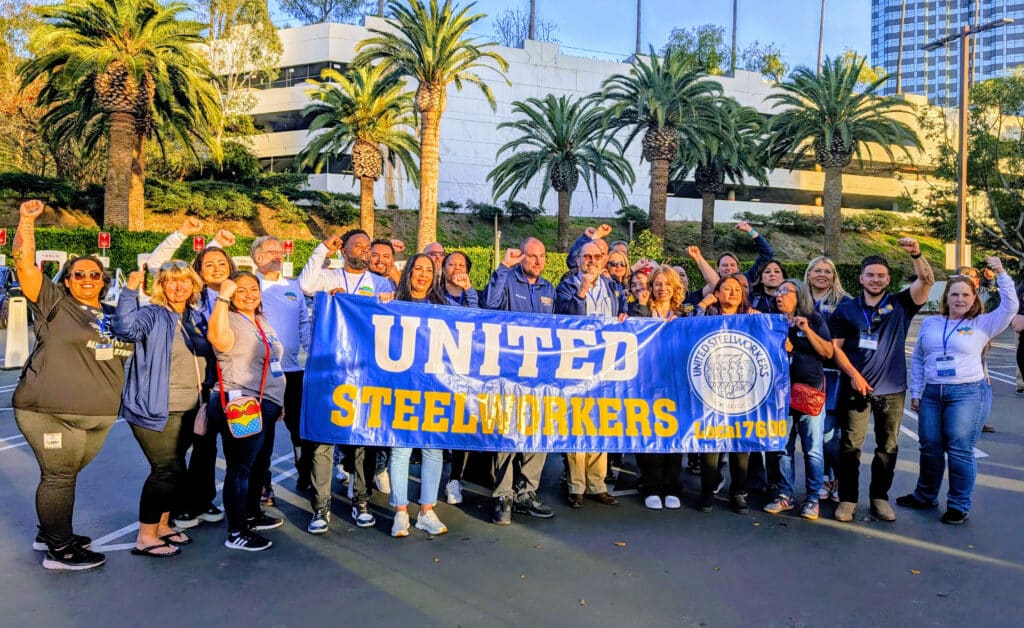Brazilian Unions Stand Up to Huhtamaki
National Chemical Workers’ Confederation, Chemical Workers’ Union of Bahia hold Protest in Solidarity with U.S. Workers
 Workers at the Bahia unit of Huhtamaki Corp., in the Brazilian plastics industry hub of Camaçari, delayed the start of their morning shift by three hours on Thursday, Aug. 21, in solidarity with Huhtamaki workers in the United States.
Workers at the Bahia unit of Huhtamaki Corp., in the Brazilian plastics industry hub of Camaçari, delayed the start of their morning shift by three hours on Thursday, Aug. 21, in solidarity with Huhtamaki workers in the United States.
Their American counterparts are suffering the effects of low wages, precarious and unsafe working conditions, anti-union practices and disrespect for International Labour Organization (ILO) norms.
Huhtamaki, which produces cartons and containers for food and other consumer goods, has 15,000 employees at 61 facilities in 30 countries, including 3,500 at 21 facilities in the United States. Workers at five U.S. plants are members of the USW.
Thursday’s action was organized jointly by Brazil’s National Chemical Workers’ Confederation (CNQ) and the Chemical Workers’ Union of the state of Bahia (Sindiquímica-BA) at the request of U.S. unions and workers who met with CNQ President Lucineide Varjão during the USW international convention earlier this month in Las Vegas.
“They are casualized, humiliated and in some units wear adult diapers not to have to go to the toilet; they work long days without overtime pay,” said CNQ President Lucineide Varjão. “You can be sure that this protest will have repercussions in many countries and perhaps we will make this Finnish multinational stop these practices,” Varjão explained.
 Leaders of chemical workers’ unions from around the country took part in the protest, since they were in the neighboring town of Salvador for a meeting of the CNQ executive board. Many spoke of the importance of international solidarity in the face of restructuring processes in multinational corporations.
Leaders of chemical workers’ unions from around the country took part in the protest, since they were in the neighboring town of Salvador for a meeting of the CNQ executive board. Many spoke of the importance of international solidarity in the face of restructuring processes in multinational corporations.
“If we the workers do not act internationally, we will be hostages of the restructuring of production. Multinationals have no homeland. Nowadays we go to sleep working for one employer and wake up working for another, so it is important that we create union networks with our brothers and sisters from other countries and take action on that basis,” said Fábio Lins, CNQ international relations secretary.
The leadership of Sindiquímica-BA stressed the advances workers have achieved through union mobilization at the Huhtamaki unit of the Camaçari plastics industry hub.
 Health and safety representative Leandro dos Santos, a former shop steward, said that through the leadership of Sindiquímica, unionization rates inside the factory have improved and victories have started coming.
Health and safety representative Leandro dos Santos, a former shop steward, said that through the leadership of Sindiquímica, unionization rates inside the factory have improved and victories have started coming.
“Every advance is made through the struggle. Without a fight, we get nothing. We have gained a good health insurance plan, good transport, but there are still managers who come in from outside and try to coerce our people, and that we can’t accept, not at all,” dos Santos said.
In 2013, Huhtamaki reported $3.21 billion in net sales as well as record-setting earnings per share.
Still, workers at the company report that conditions in non-union plants are dramatically different from those in unionized plants. While Huhtamaki appears to be expanding production sites, it also appears to be expanding a low-wage, low-cost, low-responsibility model of employment for workers. Under this model, workers in non-union plants face low wages, few or no benefits, unsafe working conditions, arbitrary decision making, and an uncertain future for their jobs and their longer-term expectations.
By clicking Sign Up you're confirming that you agree with our Terms and Conditions.
Recent News Articles
Want to Learn More?
See how the USW is making a real difference in our communities and our workplaces.
